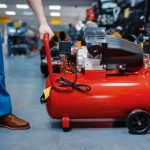 If you are in the market for an air compressor, you may be overwhelmed by the sheer number of options available. With different sizes, power levels, and features, selecting the right air compressor can be a challenging task. To help you make an informed decision, we have put together this ultimate guide to choosing the perfect air compressor for your specific needs.
If you are in the market for an air compressor, you may be overwhelmed by the sheer number of options available. With different sizes, power levels, and features, selecting the right air compressor can be a challenging task. To help you make an informed decision, we have put together this ultimate guide to choosing the perfect air compressor for your specific needs.
1. Determine the Purpose
Before you start looking for an air compressor, it is crucial to determine your intended use. Are you planning to use it for automotive repairs, home improvement projects, or industrial applications? Each purpose may require a different type of air compressor, so understanding your needs will guide you in selecting the right one.
2. Consider the PSI and CFM Requirements
PSI (pounds per square inch) and CFM (cubic feet per minute) are two important specifications to evaluate when choosing an air compressor. PSI indicates the maximum pressure the compressor can deliver, while CFM represents the amount of air it can output per minute. Ensure the compressor you choose can meet the requirements of the tools or equipment you will be using. Taking into account both the required PSI and CFM will ensure optimal performance.
3. Decide on the Power Source
Air compressors can be powered by various sources like electricity, gasoline, or diesel fuel. Electric air compressors are popular due to their availability, affordability, and ease of use. However, if you need a portable air compressor or will be working in remote locations with no power access, a gas-powered or diesel-powered compressor may be a better choice.
4. Evaluate the Tank Size
Another important aspect to consider is the tank size of the air compressor. The tank holds compressed air, which is essential for providing a steady flow to your tools. Smaller tasks may require a smaller tank, while larger projects demand a larger tank to handle the increased air consumption. Remember that larger tanks can hold more air reserves, allowing the compressor to run less frequently.
5. Noise Level
Noise production is a factor often overlooked when choosing an air compressor. If you plan to work in a residential area or an environment where noise is a concern, opt for a compressor with lower decibel levels. Look for models with sound-dampening features or oil-less designs, which tend to be quieter.
6. Portability and Size
Consider how portable you need your air compressor to be. If you will move it frequently around a job site or between locations, a lightweight and compact size will be advantageous. On the other hand, if it will reside in a fixed location, a larger, stationary model might be suitable.
7. Duty Cycle and Continuous Use
The duty cycle refers to the amount of time an air compressor can run before requiring a cooldown period. Compressors with a high duty cycle can work continuously for extended periods, making them ideal for industrial or professional use. If you plan to use your compressor for longer durations or demanding applications, selecting a model with a high duty cycle will ensure it can keep up with your workload.
8. Maintenance Requirements
Regular maintenance is crucial for the longevity and performance of your air compressor. Consider the maintenance requirements of the compressor you are considering. Look for models with easy access to components, straightforward oil changes, and accessible filters. Additionally, consider if spare parts and support are readily available to ensure long-term usability.
9. Safety Features
When working with an air compressor, safety should be a top priority. Look for models that feature safety valves to prevent pressure buildup, thermal protection to prevent overheating, and automatic shut-off switches in case of emergencies. These safety features can help prevent accidents and protect both you and your equipment.
10. Brand Reputation and Warranty
Finally, take into account the reputation of the brand and the warranty offered. Buying from a well-established brand with a good reputation ensures that you are investing in a quality product with reliable customer support. A comprehensive warranty will provide coverage should any defects or issues arise.
Summary
Choosing the perfect air compressor for your needs requires careful consideration of your intended use, specifications, power source, tank size, noise level, portability, duty cycle, maintenance requirements, safety features, and brand reputation. By following this ultimate guide, you can confidently select the right air compressor that will deliver efficient performance and meet your specific requirements.
Need an Air Compressor Store in Milwaukee, WI?
Established in 1932, Wenniger Compressor Co. specializes in air compressors, centrifugal pumps, diaphragm metering pumps, fans, generators, high-pressure air compressors, hoists (all types), lubricated reciprocating air compressors, oil separators, refrigerated air compressor dryers, rotary screw, sliding vane air compressors, submersible pumps, and vacuum pumps. Additional services include rental units, parts, lubricants, rotary screw compressors, service calls, routine maintenance, and much more. Our employees are all licensed to help you make the best decision. Contact us today to schedule an appointment or to get an estimate on the perfect service you need.
